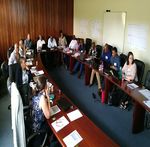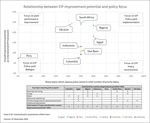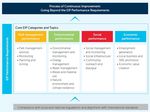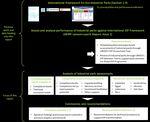LESSONS LEARNT SERIES - Issue 2 MAY 2021 TECHNICAL ASSISTANCE NEEDS FOR THE TRANSFORMATION INTO ECO-INDUSTRIAL PARKS - UNIDO ...
←
→
Page content transcription
If your browser does not render page correctly, please read the page content below
TECHNICAL ASSISTANCE NEEDS
FOR THE TRANSFORMATION
INTO ECO-INDUSTRIAL PARKS
MAY 2021
LESSONS LEARNT SERIES
Issue 2
2021©2021 The designations employed and the presentation of material in this document do not imply the expression of any opinion whatsoever on the part of UNIDO and their governing bodies concerning the legal or development status of any country, territory, city or area or of its authorities, or concerning the delimitation of its frontiers or boundaries. The views expressed in this document are those of the authors and do not necessarily reflect the views of UNIDO and its governing bodies.
TECHNICAL ASSISTANCE NEEDS
FOR THE TRANSFORMATION
INTO ECO-INDUSTRIAL PARKS
Based on assessment of 50 parks in eight countries against the
International Framework for Eco-Industrial Parks
2021CONTENTS
ACKNOWLEDGEMENTS........................................................................................................................... V
ABBREVIATIONS .................................................................................................................................... VI
EXECUTIVE SUMMARY ......................................................................................................................... VII
1 INTRODUCTION ............................................................................................................................ 11
1.1 THIS REPORT .......................................................................................................................... 11
1.2 GLOBAL ECO-INDUSTRIAL PARKS PROGRAMME ............................................................................ 11
1.3 INTERNATIONAL EIP FRAMEWORK AND ITS APPLICATION................................................................ 12
2 METHODOLOGY............................................................................................................................ 15
3 CONSOLIDATED GLOBAL RESULTS ................................................................................................. 17
3.1 COMPLIANCE SCORINGS ........................................................................................................... 17
3.2 TECHNICAL ASSISTANCE NEEDS................................................................................................... 18
4 COMPARATIVE COUNTRY RESULTS ................................................................................................ 24
4.1 COMPLIANCE SCORINGS ........................................................................................................... 24
4.2 COMPLIANCE VERSUS IMPROVEMENT POTENTIAL........................................................................... 28
4.3 CAPACITY BUILDING ................................................................................................................. 32
4.4 ADVISORY SERVICES ................................................................................................................. 34
4.5 INVESTMENT FACILITATION ....................................................................................................... 36
4.6 POLICY SUPPORT ..................................................................................................................... 38
5 CONCLUSIONS AND RECOMMENDATIONS ..................................................................................... 41
5.1 CONCLUSIONS ........................................................................................................................ 41
5.2 RECOMMENDATIONS ............................................................................................................... 42
ANNEX A: METHODOLOGY DETAILS ...................................................................................................... 44
ANNEX B: RESULTS PER COUNTRY ........................................................................................................ 47
COLOMBIA ...................................................................................................................................... 47
EGYPT ........................................................................................................................................... 51
INDONESIA ...................................................................................................................................... 55
PERU ........................................................................................................................................... 58
SOUTH AFRICA................................................................................................................................. 62
UKRAINE ........................................................................................................................................ 66
VIET NAM....................................................................................................................................... 70
ANNEX C: PREREQUISITES AND PERFORMANCE INDICATORS OF INTERNATIONAL EIP FRAMEWORK ...... 74
ivACKNOWLEDGEMENTS
Acknowledgements to all UNIDO team members who lead, managed and/or contributed to EIP assessments
of the 50 industrial parks in eight countries on which this report is based upon.
Acknowledgements go to all national counterparts, staff members of the park management and tenant firms
of the industrial parks which participated in and contributed to UNIDO’s baseline and opportunity
assessments against the International Framework for Eco-Industrial Parks:
» Colombia: Parque Industrial Malambo (PIMSA), ZF de Occidente, ZF La Candelaria, ZF del Cauca, ZF del
Pacífico;
» Egypt: El Robbiki IP, Polaris International and Al Zamil IP, SIDC Industrial Park (in Suez Canal SEZ);
» Indonesia: Batamindo IP, Bintan Inti, BSBcity, Gresik, Kabil IP, KIIC, Maspion, MM2100, Modern
Cikande, Safe n Lock, Suryacipta;
» Nigeria: Calabar Free Trade Zone, Lekki Free Zone; (Nigeria is not participating in GEIPP)
» Peru: Adepia IP, Ancón Private IP, Indupark, La Chutana IP, Lurin IZ, Sector 62 IP;
» South Africa: Atlantis SEZ, Babelegi IP, Bodirelo IP, Botshabelo IP, Dube TradePort SEZ, East London IDZ,
Ekandustria IP, Phuthaditjhaba IP, Rosslyn Automotive Supplier Park, Seshego IP, Vulindlela IP;
» Ukraine: IP Agromash (Zaporizhzhia), IP BTsVAK, IP Chemical metallurgical plant, IP Patriot;
» Viet Nam: Amata, Deep C1&C2, Hiep Phuoc, Hoa Khanh, Khanh Phu, Long Thanh, Pho Noi A, Tra Noc
1&2.
The Global Eco-Industrial Parks Programme (GEIPP) (2019-2023) is made possible by funding provided by the
Swiss Government through the State Secretariat for Economic Affairs of Switzerland (SECO).
The assessments against the International EIP Framework of two industrial parks in Nigeria (Calabar Free
Trade Zone, Lekki Free Zone) and two parks in South Africa (Rosslyn Automotive Supplier Park and
Phuthaditjhaba Industrial Park) were produced as part of the assignment “Enabling investments towards EIPs
in Nigeria and South Africa”, funded by the German Federal Ministry for Economic Cooperation and
Development (BMZ) through the Deutsche Gesellschaft für Internationale Zusammenarbeit (GIZ) GmbH.
vABBREVIATIONS
A2F Access to Finance
EIP Eco-Industrial Park
FTZ Free Trade Zone
GEIPP Global Eco-Industrial Parks Programme (UNIDO)
GHG Greenhouse Gas
Deutsche Gesellschaft für Internationale Zusammenarbeit
GIZ
(German Development Cooperation)
IDZ Industrial Development Zone
IFC International Finance Corporation (part of World Bank Group)
IP Industrial Park
ISO International Standard Organisation
IZ Industrial Zone
OH&S Occupational Health and Safety
PPP Public Private Partnership
RECP Resource Efficient and Cleaner Production
SDG Sustainable Development Goal
SEZ Special Economic Zone
SME Small and Medium-sized Enterprise
UNIDO United Nations Industrial Development Organization
WBG World Bank Group
ZF Zona Franca
viEXECUTIVE SUMMARY Introduction This report is the second publication of the GEIPP’s “Lessons Learnt” series aimed at compiling and disseminating results from the Global Eco-Industrial Parks Programme (GEIPP). The programme implements country-level interventions in Colombia, Egypt, Indonesia, Peru, South Africa, Ukraine and Viet Nam. The country-level interventions are supported by a global component that is providing methodological guidance and dissemination of good practices between and beyond GEIPP countries. The program aims at demonstrating the viability and benefits of advancing Eco-Industrial Parks practices at industrial parks in the program countries. The GEIPP is made possible by funding provided by the Swiss Government through the State Secretariat for Economic Affairs of Switzerland (SECO). Over the past years UNIDO assessed 50 parks in eight countries (the seven GEIPP countries: Colombia, Egypt, Indonesia, Peru, South Africa, Ukraine, Viet Nam as well as Nigeria) against the International Framework for Eco-Industrial Parks. This wealth of data offers the opportunity to analyse the results and extract lessons learnt for moving forward in assisting countries and industrial parks in their efforts for a more resilient, sustainable and socially considerate industrial development. This report provides: a) A comparative analysis and lessons learnt on compliance gaps of industrial parks with the International EIP Framework under park management, economic, environmental and social performance; and b) Recommended focus areas and types of technical assistance to industrial parks at global and country levels to increase their compliance with the International EIP Framework. Compliance scorings and overall priority topics Across all eight countries, the following topics of the International EIP Framework have the lowest baseline compliance scorings: Energy; Local community outreach; Environmental management and monitoring; Park monitoring and risk management; Waste and material use; Climate change and the natural environment. This indicates that technical assistance overall should prioritise these topics. The types of technical assistance for the EIP transformation typically covers training and capacity building, technical advisory services, facilitation of investment opportunities and policy support. The analysis of the compliance scorings by category and topic can be used by GEIPP as an input to determine the type of required assistance at global and country levels. Capacity building and advisory services Common types of capacity building and advisory services are provided in this report to improve the parks’ performance on each topic of the International EIP Framework, including the main target group of these efforts (e.g., park management and/or tenant firms) and prioritised countries. Capacity building typically covers both awareness raising and trainings customised to the needs to the targeted stakeholders. Advisory services cover tailor-made expert advices to address a specific opportunities and challenges facing an industrial park and/or tenant firm(s). Capacity building to park management is a key recommendation for almost all topics of the International EIP Framework. Investment facilitation Key EIP topics where there is a need to support the industrial parks and tenant firms with the facilitation of investment opportunities are: Planning and zoning; Energy; Water; Waste and materials use; Climate change and the natural environment; Social infrastructure; Local business and SME promotion; and Economic value vii
creation. Investment facilitation on the topic on “Planning and zoning” seems most needed for Nigeria, South
Africa and Ukraine. Social and economic topics which require financial investment show a lower
improvement potential compared to environmental and park management topics requiring financial
investment. This seems to indicate that the investment facilitation efforts of GEIPP should prioritise
environmental and park management topics. Overall, South Africa and Nigeria seem to benefit the most (in
terms of their compliance with International EIP Framework) from investment facilitation. Peru shows lower
intended improvements on topics which require financial investment, indicating a lower potential to increase
their compliance with the International EIP Framework through investment facilitation.
Policy support
The main entry point for the technical assistance on most topics is the park management entity (“bottom-up
approach”). However, for a number of topics there is a potential key role for government agencies to support
the EIP transformation through policy support (“top-down approach). Key examples of regulatory challenges
faced by industrial park management and tenant firms that would benefit from the strengthening of policy
support include: The planning and zoning of industrial parks, expanding the requirements and incentives to
industrial parks/firms to address and adapt to climate change, streamlining regulations to facilitate the safe
reuse and recycling of industrial by-products and effluent streams between tenant firms.
Comparative country results
Detailed results of the compliance scorings and technical assistance needs for each of the GEIPP countries
are included in Annex B of this report (Colombia, Egypt, Indonesia, Peru, South Africa, Ukraine, Viet Nam).
The analysis of the country-average compliance scorings and their specific technical assistance will be used
as an input for the GEIPP country teams to determine the type of required assistance in the GEIPP country
level projects.
Recommendations
Recommendations for (inter)national programmes supporting EIP transformations in specific countries:
» Use the EIP Assessment Tool (available from: https://www.greenindustryplatform.org/tools-and-
platforms/unidos-eco-industrial-parks-eip-tools-english) to assess the baseline and intended
performance of selected industrial parks in country against the International EIP Framework;
» Develop a country profile for the EIP transformation of industrial parks (as outlined in Annex B of this
report), including levels of baseline and intended performance against the International EIP Framework
and priority topics for technical assistance;
» Plot the results from the EIP assessments (baseline compliance versus improvement potential) for each
category of the International EIP Framework and then assess for expected and unexpected results (see
Section 4.2 of this report);
» Perform a root-cause analysis for any expected / unexpected results on specific topics covered by the
International EIP Framework;
» Use the findings and learnings from steps above to scope and prioritise technical assistance activities
for the EIP transformation of industrial parks in the country, including capacity building, advisory
services, investment facilitation and policy support (see Chapter 4 and Annex B of this report).
viiiRecommendations for national stakeholders (e.g., industrial park management entities, relevant government
agencies) in the eight countries assessed in this report:
» Use the findings and learnings presented in this report to gain a better understanding of the current
status of (eco-)industrial parks and potential for the EIP transformation in the country;
» Use this report as an input to scope and prioritise activities to support industrial parks in their EIP
transformation either through “top-down approaches” (policy support) or “bottom-up approaches”
(direct support to the industrial parks and tenant firms).
Recommendations for the Global Eco-Industrial Parks Programme:
» Use the analysis of the compliance scorings and technical assistance options per topic of the
International EIP Framework as an input for the planning and scoping of technical assistance
activities of the GEIPP country level projects. The provided capacity building and advisory service
options need to be adapted and prioritised according to national contexts and needs in the
countries;
» Use the findings and approach of this report for initial scoping of technical assistance to industrial
parks and government stakeholders;
» Introduce the approach in further collaborations between UNIDO and leading international
organisations working on EIPs.
ix1 INTRODUCTION
1.1 T HIS REPORT
This report is the second publication of the GEIPP’s “Lessons Learnt” series aimed at collecting and
disseminating results from the Global Eco-Industrial Parks Programme.
Based on the results of the EIP assessments undertaken with 50 industrial parks in eight countries by UNIDO
to date, this GEIPP report reviews and provides insights into the technical assistance needs to transform
industrial parks into eco-industrial parks. Specifically, it covers a comparative analysis and lessons learnt on:
» Compliance gaps of industrial parks with the International EIP Framework under park management,
economic, environmental and social performance;
» Recommended focus areas and types of technical assistance to industrial parks at global and country
levels to increase their compliance with the International EIP Framework.
1.2 G LOBAL ECO -I NDUSTRIAL P ARKS P ROGRAMME
The objective of the Global Eco-Industrial Parks Programme (GEIPP) is to demonstrate the viability and
benefits of greening industrial parks by improving resource productivity and economic, environmental and
social performances of businesses and thereby contributing to inclusive and sustainable industrial
development in the participating developing and transition economies.
Figure 1: Overview of Global Eco-Industrial Parks Programme
Component 1 (Country level interventions) implements tailor-made initiatives in seven countries: Colombia,
Egypt, Indonesia, Peru, South Africa, Ukraine and Viet Nam, including incentivation of EIPs in policies/
regulations as well as identifcation and implementation of EIP opportunities in selected industrial parks.
Component 2 (Global Knowledge Development) focuses on the development of specific EIP tools, providing
methodological guidance and dissemination of good practices between GEIPP countries and lessons learnt
from international experiences.
| 11The Global Eco-Industrial Parks Programme (2019-2023) is made possible by funding provided by the Swiss
Government through the State Secretariat for Economic Affairs of Switzerland (SECO).
1.3 I NTERNATIONAL EIP FRAMEWORK AND ITS APPLICATION
UNIDO, World Bank Group and GIZ (German Development Cooperation) have collaborated to develop an
international framework which provides guidance on what constitutes an eco-industrial park and how an
industrial park can work towards becoming an eco-industrial park1.
Figure 2: Overall framework for describing Eco-Industrial Parks (UNIDO, WBG, GIZ, 2017)
The framework is based on four key categories: Park management performance, environmental
performance, social performance, and economic performance. The requirements within each category are
divided into “prerequisites” and “performance indicators,” that can be verified and measured in qualitative
and/or quantitative terms. The prerequisites highlight the basic requirements for EIPs, and the
performance indicators describe expected performance levels that an EIP must meet. As a baseline,
industrial parks must comply with all applicable local and national regulations. Further details on the
international framework can be downloaded from the publication weblink in the footnote.
To date, 50 industrial parks in eight countries (Colombia, Egypt, Indonesia, Nigeria, Peru, South Africa,
Ukraine, and Viet Nam) have been assessed by UNIDO team on their baseline and intended performance
against the prerequisites and performance indicators outlined in the International EIP Framework. These
parks are presented in Figure 3.
1 UNIDO, WBG, GIZ (2017). An International Framework for Eco-Industrial Parks.
https://openknowledge.worldbank.org/handle/10986/29110.
| 12Figure 3: Map showing 50 industrial parks in eight countries assessed to date by UNIDO
| 132
Methodology
| 142 METHODOLOGY
The figure below presents the overall methodology applied to identify, review and consolidate the technical
assistance needs for the EIP transformations at global and country levels. The figure includes cross-references
to relevant chapters in this report. Details of the methodology are included in Annex A and the following
chapters. The results per country are provided in Annex B2.
Figure 4: Methodology overview
2 Note this is provided only for the countries included in GEIPP.
| 15Technical assistance needs:
Consolidated global results
3
| 163 CONSOLIDATED GLOBAL RESULTS
3.1 C OMPLIANCE SCORINGS
Figure 5 presents the average compliance scorings of the 50 industrial parks assessed in eight countries, organised by the categories and topics of the
International EIP Framework. The detailed methodology underpinning this figure is available in GEIPP Lessons Learnt Series, Issue 1; Lessons learnt from
assessing 50 Industrial parks in eight countries against the International Framework for Eco-Industrial Parks.
Figure 5: EIP score card at global level
| 17Overall, the baseline compliance of all parks assessed to date is 49% with an intended compliance of 65%,
giving an improvement potential of 16% across all eight countries. The environmental and social performance
categories have lower compliance (34% and 44% respectively) compared to economic performance (72%
baseline compliance) and park management (55% compliance). However, park management shows highest
intended improvement potential (25%) compared to other categories.
Across all eight countries, the following topics have the lowest baseline compliance scorings indicating that
technical assistance overall should prioritise these topics covered by International EIP Framework:
» Energy (28%);
» Local community outreach (28%);
» Environmental management and monitoring (30%);
» Park monitoring and risk management (31%);
» Waste and material use (32%);
» Climate change and the natural environment (38%).
The following topics have the highest baseline compliance scorings across all eight countries indicating overall
that park management and tenant firms need less intensive technical assistance on these topics covered by
the International EIP Framework:
» Employment generation (87%);
» (Basic) park management services (75%);
» Economic value creation (69%).
3.2 T ECHNICAL ASSISTANCE NEEDS
Table 1 presents a review of the technical assistance needs at global level, based on the EIP assessments of
50 parks across eight countries. The table indicates the types of technical assistance recommended per topic
covered by the International EIP Framework.
Key points on the technical assistance for the EIP transformation across all eight countries are:
» The types of technical assistance for the EIP transformation typically cover training and capacity
building, technical advisory services, investment facilitation and policy support. Specific topics under
park management, economic, environmental and social performance that industrial parks do not
fulfill indicate topics for technical assistance. Therefore, the analysis of the compliance scorings by
category and topic can be used by GEIPP as an input to determine the type of required assistance at
global and country levels;
» Common options for technical assistance are provided in Table 2 in order to work towards meeting
specific prerequisites and performance indicators defined under each to topic. The list of provided
technical assistance options is not all-inclusive. It is up to each GEIPP country team to review the
applicablicaty of each option for their respective country and industrial parks;
» Training and capacity building to park management is a key recommendation for almost all topics.
Capacity building to tenant firms covers all environmental topics as well as most topics under social
and economic performance. Often, when working on the EIP transformation of industrial parks,
capacity building sessions to park management and tenant firms can be combined on topics of
common interest (e.g. development of industrial synergies, park management services to tenant
firms, access-to-finance). On the other hand, certain EIP topics are most relevant either to park
management (e.g. EIP concept design planning, EIP baseline assessment) or tenant firms (e.g.
resource efficient and cleaner production);
| 18» The main entry point for the technical assistance to the parks on most topics is the park
management entity and the tenant companies in the parks (“bottom-up approach”). However, for a
number of topics there is a potential key role for government agencies to support the EIP
transformation through policy support (“top-down approach”). Examples of regulatory challenges
faced by industrial park management and tenant firms that would benefit from the strengthening of
policy support include: The planning and zoning of industrial parks, expanding the requirements and
incentives to industrial parks/firms to address and adapt to climate change, streamlining regulations
to facilitate the safe reuse and recycling of industrial by-products and effluent streams between
tenant firms;
» For the EIP transformation and technical assistance to industrial parks it is key to focus on the
implementation of both short-term (up to 2 years) as well as medium-/long-term initiatives (up to 5
years). The short-term initiatives should focus on low cost and “quick win” measures to deliver
concrete benefits and thereby secure ongoing commitment and interest amongst park stakeholders
to the EIP concept. The medium-term initiatives should focus more on investment opportunities
which deliver strategic and substantial benefits to the park and its stakeholders. In this regard, Table
1 highlights topics where this a need for support industrial parks and tenant firms with the
facilitation of investment opportunities (e.g. Planning and zoning; Energy; Water; Waste and
materials use; Climate change and the natural environment; Social infrastructure; Local business and
SME promotion; and Economic value creation).
| 19Table 1: Review of technical assistance needs at global level
BASELINE
INTERNATIONAL EIP FRAMEWORK TYPE OF TECHNICAL ASSISTANCE NEEDS
COMPLIANCE
TRAINING AND CAPACITY TECHNICAL ADVISORY
Number of BUILDING SERVICES FACILITATE POLICY
Topic prerequisites & All country ratings
To park To tenant To park To tenant INVESTMENT SUPPORT
indicators
management companies management companies
PARK MANAGEMENT
(Basic) park
4 75% X X
management services
Monitoring and risk
4 31% X X
management
Planning and zoning 1 59% X X X X
ENVIRONMENT
Management and
2 30% X X
monitoring
Energy 6 28% X X X X X X
Water 4 42% X X X X X X
Waste and material
3 32% X X X X X X
use
Climate change and
the natural 5 38% X X X X X
environment
SOCIAL
Social management
6 54% X X X
systems
Social infrastructure 5 50% X X X X
Local community
2 28% X X
outreach
ECONOMIC
Employment
3 87% X X
generation
Local business & SME
3 58% X X X
promotion
Economic value
3 69% X X X
creation
| 20Table 2: Common technical assistance options per topic of the International EIP Framework
Topics in Common technical assistance options
International EIP
Framework
Park management
• Set up and operate a well-functioning park management entity.
(Basic) park • Manage and maintain park property, infrastructure, and services.
management • Set up and effectively operate contracts/charters/agreements with tenant companies.
services • Provide services and common infrastructures which meet demands of existing and new
tenant companies.
• Set up and maintain a monitoring system for economic, environmental and social
performance of park and critical risks.
• Set up and maintain a plan to react to possible negative impacts due to climate change risks.
Monitoring and risk
management • Set up and maintain a functioning system to comply with regulations and international
standards.
• Set up and maintain sustainability reporting for the park (e.g., in line with International EIP
Framework).
Planning and • Develop an industrial park Master Plan incorporating all key building blocks of Master
zoning Planning and embedding EIP approaches.
Environment
Management and • Set up and maintain environmental / energy management system for industrial park.
monitoring • Set up and maintain environmental / energy management system.
• Energy efficiency and RECP related approaches.
• Identify and assess available waste heat sources in the park.
• Monitoring energy within the operation of park and tenant companies (with the aim to
Energy reduce consumption).
• Identify and assess renewable energy opportunities in the park, including feasibility studies.
• Support access-to-finance investigations.
• Set carbon and energy intensity targets and supporting action planning.
• Identify and assess effluent streams in the park operations and tenant companies and
conduct feasibility studies on potential reuses.
• Water efficiency and RECP related approaches.
Water • Water stewardship.
• Industrial effluent treatment standards and treatment processes.
• Identify and assess industrial effluent reuse opportunities in the park and feasibility studies
on potential reuses.
• Identify and assess available waste and materials streams in the park, and feasibility studies
on potential reuses.
• Resource efficiency and RECP related approaches.
Waste and material
• Material stewardship.
use
• Waste management practices, standards and treatment processes.
• Identify and assess waste avoidance, minimisation, reuse/recycling opportunities in the park
and related feasibility studies.
| 21Topics in Common technical assistance options
International EIP
Framework
• Monitoring, managing, and minimizing GHG emissions.
• Assess operational environmental impact and minimize impacts on prioritized ecosystems.
Climate change and
• Sustainable and low water-use park landscaping, including use of native flora and fauna.
the natural
environment • Pollution prevention and emission reduction strategies. This could be included in the overall
RECP trainings to companies.
• Set up and maintain risk management frameworks.
Social
• Plan and manage social quality standards.
• Set up and maintain Occupational, Health & Safety management system.
Social management • Set up and maintain effective and efficient grievance management system.
systems • Set up code of conduct systems to deal with grievances (and other social aspects as
required).
• Set up and maintain harassment prevention and response system.
• Review existing social infrastructures in the park and business case development for missing
social infrastructures.
• Set up and undertake survey with employees working in the park on their satisfaction and
Social suggestions on social infrastructure.
infrastructure • Set up and maintain effective and efficient security management and monitoring system for
the park.
• Develop skills / vocational training and development programs.
• Encourage female workforce to benefit from skills development programmes.
• Undertake community surveys in relation to opportunities, challenges of industrial parks
Local community
and seeking community feedback.
outreach
• Set up and deliver community dialogue on ongoing / regular basis.
Economic
Employment • Awareness raising on importance, benefits and lower risks arising from direct employment
generation of workers.
• Promote the establishment of SMEs in industrial park which add value to park and its
Local business &
(larger) tenant companies.
SME promotion
• Sustainable and local procurement.
• Develop feasibility studies for promising EIP initiatives, including facilitating access-to-
Economic value finance.
creation • Attract new and keep existing anchor tenants through EIP and industrial synergy
approaches.
| 224
Technical assistance needs:
Comparative country results
| 234 COMPARATIVE COUNTRY RESULTS
Detailed results of the compliance scorings and technical assistance needs for each of the GEIPP countries
(Colombia, Egypt, Indonesia, Peru, South Africa, Ukraine, Viet Nam) are included in Annex B of this report.
4.1 C OMPLIANCE SCORINGS
The analysis of the country-average compliance scorings can be used as a basis to determine the type of
required technical assistance for specific countries. Organised by the key topics of the International EIP
Framework, Table 3 illustrates the average compliance scorings of the assessed industrial parks per country
and thereby also the levels of recommended technical assistance.
Table 3: Summary of average compliance scorings at country level
| 24By country, the table above illustrates that the following topics have the lowest compliance scorings (lower
than 40%) indicating that technical assistance overall should prioritise these topics covered by International
EIP Framework:
» Colombia: Park monitoring and risk management (30%); Energy (33%); Local community outreach (40%);
» Egypt: Local community outreach (0%), Waste and material use (0%), Water (17%), Energy (22%), Park
monitoring and risk management (25%), Environmental management and monitoring (33%), Social
management systems (39%);
» Indonesia: Energy (20%);
» Nigeria: Planning and zoning (0%), Waste and material use (0%), Energy (17%), Environmental
management and monitoring (25%), Water (25%), Climate change and the natural environment (30%);
» Peru: Park monitoring and risk management (0%), Local community outreach (0%), Waste and material
use (22%), Social management systems (25%), Social infrastructure (30%), Climate change and the
natural environment (30%), Environmental management and monitoring (33%), Local business and SME
promotion (33%), Energy (36%);
» South Africa: Local community outreach (14%), Environmental management and monitoring (14%),
Waste and material use (24%), Water (25%), Energy (27%), Park monitoring and risk management (36%),
Planning and zoning (36%), Social infrastructure (38%);
» Ukraine: Park monitoring and risk management (0%), Planing and zoning (0%), Environmental
management and monitoring (0%), Energy (21%), Climate change and natural environment (25%), Social
management systems (33%), Local community outreach (38%);
» Viet Nam: Local community outreach (13%), Environmental management and monitoring (25%), Waste
and material use (38%), Local business and SME promotion (38%), Social management systems (40%).
Table 4 presents a detailed comparison of the country-averages of the baseline and intended performance as
well as the improvement potential.
| 25Table 4a: EIP score cards at country levels (Colombia, Egypt, Indonesia, Nigeria)
EIP SCORE CARDS: COUNTRY LEVELS
INTERNATIONAL EIP FRAMEWORK Level of compliance - Assessed industrial parks
(UNIDO, WORLD BANK, GIZ, 2017) Analysis of "Yes" ratings Formula = Counts "Yes" / (Total number of responses - Counts "Not applicable")
COLOMBIA EGYPT INDONESIA NIGERIA
Number of prerequisites
Topic Baseline Improvement Intended Baseline Improvement Intended Baseline Improvement Intended Baseline Improvement Intended
& indicators per topic
performance potential performance performance potential performance performance potential performance performance potential performance
OVERALL EIP SCORE 51 64% 9% 73% 45% 18% 63% 63% 13% 76% 45% 23% 69%
PARK MANAGEMENT 77% 12% 88% 67% 14% 81% 80% 9% 88% 42% 46% 88%
(Basic) park management services 4 100% 0% 100% 75% 8% 83% 91% 2% 93% 75% 25% 100%
Monitoring and risk management 4 30% 35% 65% 25% 33% 58% 48% 23% 72% 50% 13% 63%
Planning and zoning 1 100% 0% 100% 100% 0% 100% 100% 0% 100% 0% 100% 100%
ENVIRONMENT 50% 17% 67% 22% 32% 55% 45% 21% 67% 19% 29% 48%
Management and monitoring 2 60% 10% 70% 33% 17% 50% 50% 27% 77% 25% 50% 75%
Energy 6 33% 17% 50% 22% 17% 39% 20% 23% 42% 17% 33% 50%
Water 4 60% 30% 90% 17% 50% 67% 47% 28% 75% 25% 25% 50%
Waste and material use 3 47% 20% 67% 0% 44% 44% 65% 9% 74% 0% 17% 17%
Climate change and the natural 5 52% 8% 60% 40% 33% 73% 45% 18% 64% 30% 20% 50%
SOCIAL 58% 0% 58% 32% 10% 41% 76% 15% 91% 59% 9% 68%
Social management systems 6 77% 0% 77% 39% 22% 61% 88% 6% 94% 67% 8% 75%
Social infrastructure 5 58% 0% 58% 57% 7% 63% 73% 20% 92% 60% 20% 80%
Local community outreach 2 40% 0% 40% 0% 0% 0% 68% 18% 86% 50% 0% 50%
ECONOMIC 78% 3% 81% 74% 7% 81% 64% 3% 67% 78% 6% 83%
Employment generation 3 100% 0% 100% 100% 0% 100% 86% -12% 74% 83% 0% 83%
Local business & SME promotion 3 73% 0% 73% 44% 11% 56% 45% 3% 48% 67% 17% 83%
Economic value creation 3 60% 10% 70% 78% 11% 89% 59% 18% 77% 83% 0% 83%
| 26Table 4b: EIP score cards at country levels (Peru, South Africa, Ukraine, Viet Nam)
EIP SCORE CARDS: COUNTRY LEVELS
INTERNATIONAL EIP FRAMEWORK Level of compliance - Assessed industrial parks
(UNIDO, WORLD BANK, GIZ, 2017) Analysis of "Yes" ratings Formula = Counts "Yes" / (Total number of responses - Counts "Not applicable")
Number of prerequisites PERU SOUTH AFRICA UKRAINE VIET NAM
Topic Baseline Improvement Intended Baseline Improvement Intended Baseline Improvement Intended Baseline Improvement Intended
& indicators per topic
performance potential performance performance potential performance performance potential performance performance potential performance
OVERALL EIP SCORE 51 37% 7% 45% 44% 24% 68% 40% 24% 64% 51% 11% 62%
PARK MANAGEMENT 33% 12% 45% 45% 40% 85% 19% 63% 81% 78% 8% 86%
(Basic) park management services 4 50% 14% 64% 61% 30% 91% 56% 31% 88% 88% 0% 88%
Monitoring and risk management 4 0% 21% 21% 36% 27% 64% 0% 56% 56% 59% 13% 72%
Planning and zoning 1 50% 0% 50% 36% 64% 100% 0% 100% 100% 88% 13% 100%
ENVIRONMENT 37% 8% 45% 26% 28% 54% 30% 14% 43% 41% 11% 52%
Management and monitoring 2 33% 0% 33% 14% 27% 41% 0% 0% 0% 25% 6% 31%
Energy 6 36% 11% 47% 27% 15% 42% 21% 21% 42% 46% 2% 48%
Water 4 63% 13% 75% 25% 34% 59% 44% 13% 56% 56% 9% 66%
Waste and material use 3 22% 17% 39% 24% 27% 52% 58% 0% 58% 38% 13% 50%
Climate change and the natural 5 30% 0% 30% 40% 35% 75% 25% 35% 60% 43% 23% 65%
SOCIAL 18% 9% 28% 39% 16% 55% 39% 23% 61% 32% 9% 41%
Social management systems 6 25% 0% 25% 65% 9% 74% 33% 8% 42% 40% 6% 46%
Social infrastructure 5 30% 3% 33% 38% 16% 55% 45% 10% 55% 43% 15% 58%
Local community outreach 2 0% 25% 25% 14% 23% 36% 38% 50% 88% 13% 6% 19%
ECONOMIC 61% 0% 61% 79% 9% 88% 81% 6% 86% 58% 15% 74%
Employment generation 3 100% 0% 100% 85% 6% 91% 75% -8% 67% 67% 17% 83%
Local business & SME promotion 3 33% 0% 33% 67% 15% 82% 100% 0% 100% 38% 4% 42%
Economic value creation 3 50% 0% 50% 85% 6% 91% 67% 25% 92% 71% 25% 96%
| 274.2 C OMPLIANCE VERSUS IMPROVEMENT POTENTIAL
Figure 6 provides a comparative review of the countries’ baseline compliance scorings and their intended
improvements, organised by the main categories of the International EIP Framework (e.g., park management,
environmental, social and economic performance). For each of the categories, the average of the baseline
compliance and intended improvement for all eight countries is marked with a grey box and horizontal/vertical
dashed axis.
If the country-average scoring on the baseline compliance is lower in a specific category, it can generally be
expected that the improvement potential in the same category is higher (top left corner in Figure 6). On the
other hand, if a country-average baseline compliance scoring is higher, a lower improvement potential can be
expected (bottom right corner in Figure 6). It is unexpected if the country-average scorings are in the top right
corner (higher baseline compliance and higher intended improvement) or bottom left (lower baseline
compliance and lower intended improvement). In these cases, there is a need for analysis and research on the
root-causes. An initial analysis of the root-causes in provided in Table 5.
Table 5: Observations for review of baseline compliances versus improvement potentials per country
Category Key observations Comments and potential root-causes
Park Expected findings:
Management • Overall, the park management category is • It seems to indicate the robustness of the methodology as
consistent with regards to higher compliance the EIP assessments are done through a systematic
scorings and lower improvement potentials across approach in close collaboration with park management.
the countries (and visa versa). Most park management prerequisites and performance
indicators are under the direct influence of park
• Ukraine, Nigeria and South Africa show lower management entity.
baseline compliance scorings on park
management, but also higher improvement
potentials.
• Egypt, Colombia, Viet Nam and Indonesia are the
countries with higher baseline compliance
scorings on park management, but also a lower
improvement potential.
Unexpected findings:
• Peru shows a low baseline compliance scoring on • This inconsistency could indicate that park management
park management, but also a low improvement entities in Peru are in their earlier maturity stages, and that
potential. there is need for awareness raising to park management and
also to seek a commitment to higher compliance scorings on
park management topics.
• Higher improvement potential could also be achieved
through developing a clear policy vision for EIP
transformation in the country.
Environmental Expected findings:
performance • Egypt, Nigeria, South Africa show a lower
compliance on environmental topics also have
higher improvement potential.
Unexpected findings:
• Indonesia shows a higher compliance scoring on • Overall, Indonesia has a strict enforcement of the
environmental performance, but also a higher environmental regulations for industries, particularly on
improvement potential. waste. This creates a setting where already high performing
industrial parks and tenant companies are performing even
higher in the EIP category environment. However, there is
further scope for energy, materials and water efficiency.
| 28Category Key observations Comments and potential root-causes
• Ukraine shows a lower baseline compliance • There is a lack of incentives and a weaker enforcement of
scoring on environmental performance, but also a regulations in the environmental domain. Further the
lower improvement potential. economic benefits of improving environmental performance
(e.g., through RECP and EIPs) are not yet widely understood.
Social Expected findings:
performance • Ukraine and South Africa show lower compliance
on social topics, but also have higher
improvement potential.
• Nigeria shows a higher baseline compliance
scoring on social topics, but also lower
improvement potential.
Unexpected findings:
• Indonesia shows a higher baseline compliance on • There is a robust legislation and compliance of social
social performance, but also showing a higher regulations at Indonesian industries, which are followed.
improvement potential. There are some aspects like security and primary social
infrastructure that parks are keen to strengthen. There is
scope and commitment of a stronger community outreach
from industrial parks which is reflected in the high
improvement potential.
• Peru, Egypt and Viet Nam show a lower baseline • There may still be formal distance between park
compliance on social topics, but also a lower management/governance and workers/community in the
intended improvement. park. Therefore, there may be a need to create supporting
• Colombia does not show any improvement systems on social topics (including community outreach)
potential on social performance category. aiming at addressing social issues collaboratively.
To be noted, the indicators in this category require surveys
that have not been undertaken to confirm the compliance
and the low score in certain countries (e.g., Viet Nam) are
attributable to the difficulty in measuring the indicators.
Economic Expected findings:
performance • Viet Nam shows a lower compliance on economic
topics, but also have higher improvement
potential.
• Nigeria, Ukraine and Colombia show a higher
baseline compliance scorings on economic topics,
but also lower improvement potential.
Unexpected findings:
• South Africa and Egypt show higher baseline • Baseline compliance on “Employment generation” is at 100%
compliance scorings on economic performance, already for Peru and South Africa.
but also showing a higher improvement. • Countries may have limited incentives for local procurement.
• Peru does not show any improvement potential Some parks are located in places where there are limited
on economic performance category. local suppliers.
• The local economic situation and prospects for attracting
tenants may influence the improvement in this category. As
parks mature and number of tenants increase, the
improvement potential can be expected to rise.
• There is an opportunity to refine the formulation of
performance indicators in a next version of the International
EIP Framework (“Park management entity has plans to
generate specific numbers and types of jobs in line with
government targets”. Details are discussed in issue 1 of the
GEIPP Lessons Learnt Report3.
3 UNIDO (2020). Lessons learnt from assessing 50 industrial parks in eight countries against the International Framework for Eco-
Industrial Parks. Issue 1 of lessons learnt series of the Global Eco-Industrial Parks Programme.
| 29Figure 6 a/b: Baseline compliance scorings versus improvement potentials per country in Park management
and Environmental performance categories4
4 The vertical and horizontal axis do not have the same scaling in each of the figures in order to show the results most clearly.
| 30Figure 6 c/d: Baseline compliance scorings versus improvement potentials in Social and Economic performance
categories per country5
5 The vertical and horizontal axis do not have the same scaling in each of the figures in order to show the results most clearly.
| 314.3 C APACITY BUILDING
Table 6 provides a comparative review of capacity building needs to improve industrial parks’ performance on
each topic of the International EIP Framework. The table lists the priority countries for each topic. Countries
have been prioritised per topic if their baseline compliance scoring is lower than 40%.
Capacity building typically covers both awareness raising and trainings customised to the needs of the targeted
stakeholders. The table makes a distinction between trainings focused on technical aspects and management
aspects, and outlines the main target groups of the capacity building efforts (e.g., park management and/or
tenant firms).
The provided capacity building options need to be reviewed, adapted and prioritised by GEIPP country teams,
following the specific national context and training needs in each country.
Table 6: Comparative review of capacity building needs
Priority countries Main target group
Topics of Common types of capacity building (e.g., awareness raising and trainings)
for capacity for capacity building
International
building
EIP Park Tenant
Baseline Core focus on technical aspects Core focus on management aspects
Framework management firms
compliance ≤ 40%
Park management
Set up and operate a well-functioning
Manage and maintain park park management entity.
(Basic) park Scoring more than property, infrastructure, and Set up and effectively operate contracts
management 40% compliance in X services. / charters / agreements with tenant
services all countries firms.
Provide services and common infrastructures which meet demands of
existing and new tenant firms.
Set up and maintain a monitoring system
for economic, environmental and social
Colombia performance of park and critical risks.
Set up and maintain a plan to
Monitoring Egypt Set up and maintain a functioning
react to possible negative
and risk Peru X system to comply with regulations and
impacts due to extreme
management South Africa international standards.
weather events and accidents.
Ukraine Set up and maintain sustainability
reporting for the park (e.g., in line with
International EIP Framework).
Nigeria
Planning and Develop a Master Plan incorporating all key building blocks of Master
South Africa X
zoning Planning and embedding EIP approaches.
Ukraine
Environmental performance
Egypt
Nigeria
Management Set up monitoring systems Set up, maintain and report on
Peru
and X X within firms and industrial park environmental / energy management
South Africa
monitoring overall. systems.
Ukraine
Viet Nam
Colombia Energy efficiency and resource
Egypt Access-to-finance for energy efficiency
efficient cleaner production,
Indonesia projects.
RECP, related approaches.
Energy Nigeria X X
Peru
South Africa Energy monitoring (including GHGs) and supporting action planning.
Ukraine
Water efficiency and resource
Egypt efficient cleaner production,
Water Nigeria X X RECP, related approaches.
South Africa Smart water-metering
Water stewardship.
| 32Priority countries Main target group
Topics of Common types of capacity building (e.g., awareness raising and trainings)
for capacity for capacity building
International
building
EIP Park Tenant
Baseline Core focus on technical aspects Core focus on management aspects
Framework management firms
compliance ≤ 40%
Egypt Material efficiency and
Nigeria resource efficient cleaner
Waste and
Peru X X production, RECP, related
material use approaches.
South Africa
Viet Nam Material stewardship, waste exchanges, data systems on waste.
Climate Egypt Pollution prevention and Set up and maintain risk management
change and Nigeria emission reduction strategies. frameworks.
X X
the natural Peru
environment Monitoring, managing, and minimizing GHG emissions.
Ukraine
Social performance
Set up, maintain and report on OH&S
management systems.
Egypt
Social Set up monitoring systems Set up, maintain and report on grievance
management Peru X X within firms and industrial park management systems.
systems Ukraine overall. Set up, maintain and report on
Viet Nam harassment prevention and response
systems.
Development of park-level
social infrastructures and
Social Peru
X X business case development.
infrastructure South Africa Develop skills / vocational training and development programs.
Set up and maintain security management and monitoring systems.
Egypt
Undertake community surveys.
Local Peru
community South Africa X
outreach Ukraine Set up and deliver community dialogue
Viet Nam events.
Economic performance
Sustainable employment contracting
Scoring more than
Employment (ensure diversity, inclusiveness, long-
40% compliance in X
generation term employment contracts for
all countries
workers).
Local Sustainable and local procurement.
business & Peru
X X Promote the establishment of SMEs in industrial park which add value to
SME Viet Nam
promotion park and its (larger) tenant firms.
Economic Scoring more than Develop feasibility studies for
Access-to-finance.
value 40% compliance in promising EIP initiatives.
creation all countries EIP concept planning.
| 334.4 A DVISORY SERVICES
The following table provides a comparative review of technical advisory services to assist industrial parks in
their EIP transformation. Same as in previous section on capacity building needs, countries have been
prioritised per topic when their baseline compliance scoring is lower than 40%.
Advisory services typically cover tailor-made expert advices to address a specific opportunity and challenges
facing an industrial park and/or tenant firms. Table 7 makes a distinction between advisory services focused
on technical aspects and management aspects, and outlines the main target group of the advisory services.
It is noted the technical advisory services need to be reviewed, adapted and prioritised by respective GEIPP
country teams following the specific national context and needs in the countries.
Table 7: Comparative review of needs for advisory services
Priority countries Common types of advisory services
Main target group
Topics of for capacity (Tailor-made advice to address specific opportunity / challenges
for advisory services
International building of industrial park/tenant firm)
EIP Framework Baseline Park Tenant
Core focus on technical aspects Core focus on management aspects
compliance ≤ 40% management firms
Park management
Scope well-functioning park
Effective management and
Scoring more management entity.
(Basic) park maintenance of park property,
than 40% Scope contracts / charters / agreements
management X infrastructure, and services.
compliance in with tenant firms.
services
all countries Scope park management services and common infrastructures meeting demands
existing and new tenant firms.
Set up a monitoring system for
economic, environmental and social
Colombia performance of park and critical risks.
Development of a plan to react to
Monitoring Egypt Set up a functioning system to comply
possible negative impacts due to
and risk Peru X with regulations and international
extreme weather events and
management South Africa standards.
accidents.
Ukraine Set up sustainability reporting for the
park (e.g., in line with International EIP
Framework).
Nigeria
Planning and Develop a Master Plan incorporating all key building blocks of Master Planning
South Africa X
zoning and embedding EIP approaches.
Ukraine
Environmental performance
Egypt
Nigeria Share international learnings from
Management
Peru environmental / energy management
and X X
South Africa systems, and their linkages to EIP
monitoring
Ukraine approaches.
Viet Nam
Undertake on-site energy efficiency
Colombia assessments with tenant firms.
Egypt Identify and assess available waste
Support access-to-finance investigations
Indonesia heat sources in the park.
for energy efficiency projects.
Energy Nigeria X X Identify and assess renewable energy
Peru opportunities in the park, including
South Africa feasibility studies.
Ukraine Support energy monitoring (including GHGs) and supporting action planning (with
the aim to reduce consumption).
Undertake on-site water efficiency
Egypt assessments with tenant firms.
Water Nigeria X X Identify and assess available effluent Set-up water-use monitoring system
South Africa streams in the park, and feasibility
studies on potential reuses.
| 34Priority countries Common types of advisory services
Main target group
Topics of for capacity (Tailor-made advice to address specific opportunity / challenges
for advisory services
International building of industrial park/tenant firm)
EIP Framework Baseline Park Tenant
Core focus on technical aspects Core focus on management aspects
compliance ≤ 40% management firms
Review existing Industrial effluent
treatment and recycling and
recommend improvements.
Support water stewardship assessment for industrial parks.
Undertake on-site material/waste
efficiency assessments with tenant Set-up park level waste management
firms. committee(s) to find solutions for
Identify and assess available waste common waste management challenges
Egypt and materials streams in the park, and and opportunities.
Nigeria feasibility studies on potential reuses.
Waste and
Peru X X Identify and assess waste avoidance,
material use
South Africa minimisation, reuse opportunities in
Viet Nam the park and feasibility studies. Set-up water/materials exchange
Review existing waste management platforms.
and treatment practices and
recommend improvements.
Support material stewardship assessment for industrial parks.
Pollution prevention and emission
Set-up risk management frameworks.
Climate Egypt reduction strategies.
change and Nigeria Assess operational environmental
X Scope pollution prevention and
the natural Peru impact and minimize impacts on
environment emission reduction strategies.
Ukraine prioritised ecosystems.
Support monitoring, managing, and minimizing GHG emissions.
Social performance
Set up grievance management systems.
Egypt Set up code of conduct systems to deal
Social
Peru with grievance (and other social aspects
management X
Ukraine as required).
systems
Viet Nam Set up and maintain harassment
prevention and response systems.
Set up survey with employees working
Review existing social infrastructures
in the park on their satisfaction and
in the park and business case
Social Peru suggestions on social infrastructure.
X development for missing social
infrastructure South Africa Promote female workforce to benefit
infrastructures.
from skills development programmes.
Develop skills / vocational training and development programs.
Egypt
Local Scope and develop community surveys.
Peru
community South Africa X
outreach Ukraine Scope community dialogue events.
Viet Nam
Economic performance
Scoring more
Opportunity assessment to increase
Employment than 40% Scope skills and services demand
X diversity, inclusiveness, long-term
generation compliance in among park tenant companies.
employment contracts for workers.
all countries
Local business Define sustainable and local
Peru procurement priorities.
& SME X X
promotion Viet Nam
Scope opportunities for SMEs to add value to the park and tenant firms.
Scoring more Develop feasibility studies for Support access-to-finance investigations
Economic than 40% promising EIP initiatives. for identified EIP opportunities.
X
value creation compliance in Support EIP concept planning process and advice on incorporating EIP concept
all countries into Master Plan.
| 35You can also read



























































